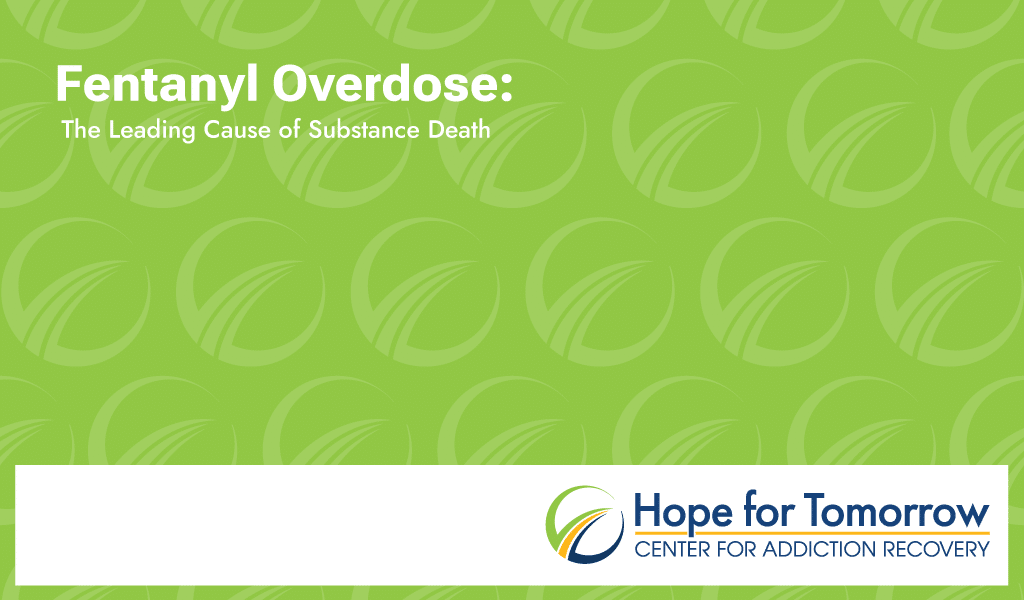

In 2021, about 80,000 Americans died due to an opioid overdose. There’s a reason it’s called “the opioid epidemic”: the illicit use of opioids has increased over the years, with deadly consequences.
One of the opioids most often involved in overdose deaths is illicitly made fentanyl. It was involved in 76% of all of West Virginia’s drug overdose deaths in 2021. Fentanyl overdose is a scary possibility for anyone using it outside of its intended purpose. If you’re a friend or family member of someone you suspect has a fentanyl use disorder, it’s natural, and even a good thing to worry about them. Worry is evidence of how much you care, and at Hope for Tomorrow, we care, too. We welcome everyone to our facility, including veterans, pregnant women, and people with complex medical conditions. Everyone deserves to live a life free of the fear of fentanyl overdose.
Thankfully, fentanyl overdose is 100% preventable. Treatment for people with fentanyl use disorder is the number one line of defense, but there are more things everyone can do to intervene in the event of an overdose. Let’s cover them, and everything you need to know about fentanyl overdose.
A fentanyl overdose is what happens when you take more fentanyl than your body can handle. Fentanyl is so potent that overdosing on it is easier than it is with any other substance.
While fentanyl impacts part of the brain responsible for pain, pleasure, and reward, bringing about euphoria and pain relief, it also impacts part of the brain responsible for breathing. It slows breathing down, so if your brain is overwhelmed by fentanyl, your breathing can slow to dangerous, and even lethal, levels. This is how people overdose on the substance.
Fentanyl is 100 times more powerful than morphine. Two milligrams is considered a potentially lethal dose, which is the equivalent of about six grains of salt. Some people may overdose on a lower dose, and some may be able to take two milligrams or more without overdosing. It depends on each individual’s body type and unique physiology.
While some people seek out fentanyl itself for its quick and intense “high,” most overdoses happen due to mixing substances, often without the knowledge of the person using them. Many dealers will add fentanyl to their supply of other substances, like heroin, to make it stronger and last longer for cheaper.

Unfortunately, because fentanyl is mixed into the supply of so many other substances, it isn’t just people intentionally using fentanyl who are at risk of overdosing from it. People who use heroin, cocaine, and methamphetamine are also at risk of an overdose due to fentanyl potentially being mixed into the supply.
Anyone who uses fentanyl intentionally is at risk of an overdose, too. Someone can overdose on it the very first time they try it, but it’s even more likely in people with fentanyl use disorders, who take larger amounts of the substance. This is especially true when someone with a fentanyl use disorder tries to stop using it suddenly, and experiences fentanyl withdrawal symptoms. If they return to fentanyl, they can easily overestimate how much their body can handle, and overdose.
One of the earliest warning signs of fentanyl overdose is breathing problems and loss of consciousness. Someone can overdose and pass away within minutes, so it’s vital to act quickly if you suspect someone is overdosing.
Knowing the signs of a fentanyl overdose can save a life. They are:
A person doesn’t need to show all of these symptoms to be experiencing an overdose. If they experience any of these symptoms, it’s best to be safe and take action.
If someone is showing the symptoms mentioned in this blog, call 911 immediately. West Virginia’s Good Samaritan Law ensures you won’t face any legal trouble for helping.
If you know people who use fentanyl or other substances, it’s a good idea to have naloxone on hand. Naloxone most often comes in nasal spray form, and is a medication that can be administered to reverse an opioid overdose. In West Virginia, you can get naloxone from your local pharmacy without a prescription. The more people that carry naloxone the better, so think about picking some up at your local pharmacy, no matter who you are.
Even if you’re able to use naloxone, it’s still important the person overdosing receives help from a medical professional. Stay with them until additional help arrives. Try to keep them awake, and lay them on their side to prevent choking.

Talking about fentanyl overdose is scary, especially if you know someone with a fentanyl use disorder, but it’s important. Knowing this information can save lives. More than that, it might be the last push you need to seek help for fentanyl use disorder – whether it’s your own or a loved one’s. There is fentanyl addiction treatment available. There is hope.
Hope for Tomorrow treats people in West Virginia with substance use disorders, fentanyl use disorder included. More than that, we treat any mental health conditions that come alongside it. We’re passionate about helping you heal and live a full and vibrant life. Give us a call at 877-679-8162 today.
Treatment today for a brighter tomorrow.